
LAW PASSED BY STATE LEGISLATURE MANDATED DISTRICTS FOR CRIMINAL COURTS, NOT COUNTIES
by Sharon Rondeau
(May 23, 2012) — While preparing his defense against the charge of “tampering with government records” issued from the “Monroe County Criminal Court” by an unknown accuser, Walter Francis Fitzpatrick made an astounding discovery: county criminal courts were made illegal by the state legislature in 1984.
Fitzpatrick has long said that the courts in Monroe County, TN as well as other counties in the state are operating outside the law and state and U.S. Constitutions because of hand-selection of jurors by judges, forged signatures, false arrests, and foremen serving for years and sometimes decades. Others have agreed that the grand juries and trial juries are rigged. The discovery of the following legislation confirms the complete corruption of the county criminal courts, as they were disposed of nearly three decades ago by the people’s representatives of the state of Tennessee.
In 1984, the Tennessee General Assembly passed a set of laws which designated judicial districts and prohibited the operation of the Tennessee county courts for criminal matters. Just as the U.S. Congress has the authority to set forth the types of cases heard by federal courts, the state legislatures have the same oversight over the state courts.
Since that time, however, Tennessee county courts have been flouting the law by continuing to adjudicate criminal matters.
The documents were first located in hard-copy format in the Athens, TN Public Library in a “2009 Replacement” book containing Tennessee Code.



The first of several laws dealing with reorganization of the court system in Tennessee reads:
16-2-501. Legislative purpose — Existing courts.
(a) The general assembly expressly declares that its purpose in enacting this part is to reorganize the existing trial court system of this state in such a way that its growth occurs in a logical and orderly manner. It does not have as its purpose the abolition of any court or judicial office.
(b) Nothing in this part shall be construed as altering, diminishing or abolishing chancery court or the constitutional and historical distinctions between chancery court and circuit court.
HISTORY: Acts 1984, ch. 931, § 1.
Several sections follow which designate the titles which judges were to retain upon the enactment of the new laws.
TCA 16-16-101 stipulated that the county courts were to handle matters of probate “and other business entrusted to it,” but criminal matters were to be handled by the new district courts.


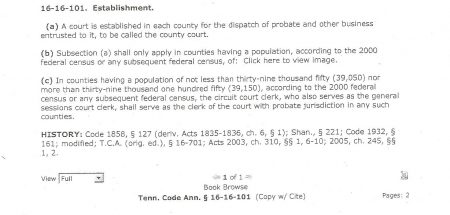
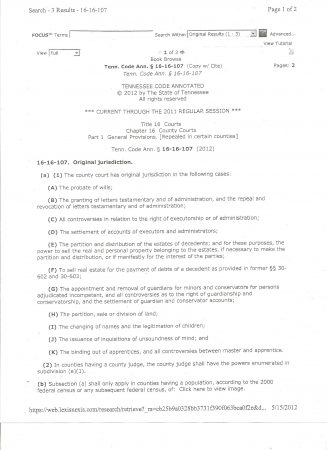


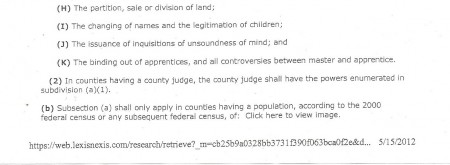
Section 16-2-506 laid out the redistricting plan for the courts, which formed judicial districts comprising several counties, with the exception of Anderson, Blount, Sullivan, Knox and several other counties, which became judicial districts unto themselves. County criminal courts were thereby abolished.
The “Tenth Judicial District” was delineated to comprise the counties of Monroe, McMinn, Polk and Bradley. The term “district attorney general,” therefore, refers to the lead prosecutor of each judicial district. While the title was invoked for that position and used on documents issued by Monroe County, the provisions of the law were not. Tennessee county courts continue to empanel grand juries to review criminal cases in contempt of the legislature’s mandate to this day.
The way in which grand juries were to be seated in each judicial district was laid out in TCA 16-2-510:
In regard to grand juries, section (c) states:
(c) New grand juries shall be impaneled at least twice a year at times selected by the presiding judge of the district. The presiding judge within each district shall be responsible for designating the foreperson and for impaneling, charging and receiving the report of the grand jury, but may designate another judge to perform these responsibilities. In those districts in which there is a criminal court judge or judges, the criminal court judge or judges shall perform the duties pertaining to the grand jury assigned to the presiding judge by this subsection (c).
The law therefore stipulated that the judge could, in fact, choose the grand jury foreman, but a grand jury was to be assembled only in a district court “at least twice a year.” The foreman would presumably be dismissed along with the other grand jurors when their work was completed. The “district” system would have allowed for a larger pool of potential jurors than with the old “county” system.
Documents and decisions issued by a criminal county court or grand jury are therefore unlawful and invalid in the state of Tennessee.
In 2008, the Tennessee General Assembly passed another law, TCA 22-2-314, which stated that jurors were to be chosen by automated means. That law has also been ignored by the judges of the state in many instances, particularly in Monroe County. The laws on record and indicated as current render any actions by “county criminal court” judges illegal and invalid.
The 1984 laws would appear to validated the citizen’s arrest of Gary Pettway, the “Monroe County grand jury foreman” of 27 years. Had the district courts been operating as mandated by the Tennessee General Assembly in 2010, there would have been no need for a citizen’s arrest, and Darren Huff would not be incarcerated today.

At 1:57 p.m. today, Fitzpatrick submitted a series of 25 motions with 24 attachments to the “Monroe County Criminal Court,” including the 1984 laws which outlawed such “criminal courts.” A package has been sent to Judge Walter C. Kurtz and one will be delivered to the filing clerk at the district attorney general’s office. The next “hearing” in Fitzpatrick’s case is scheduled for June 28, 2012.
Why the courts never conformed, or were never compelled to conform, to the laws passed in 1984 is unknown.
How many people have been indicted and convicted by the illegal “grand juries” and “county criminal court” judges over the last 28 years?



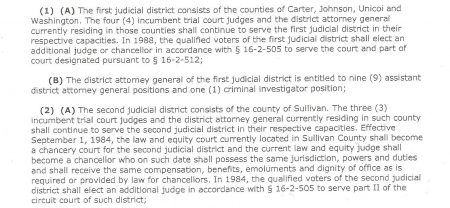
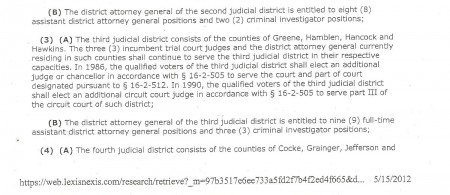
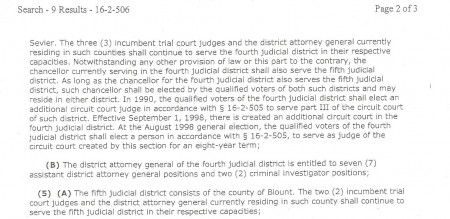
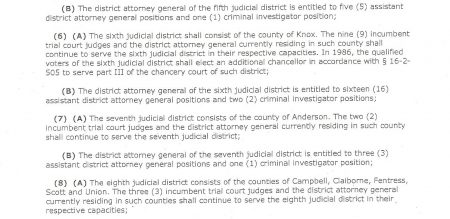
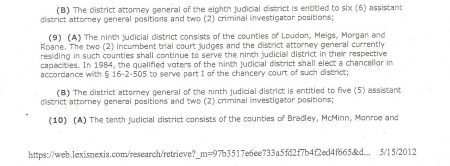

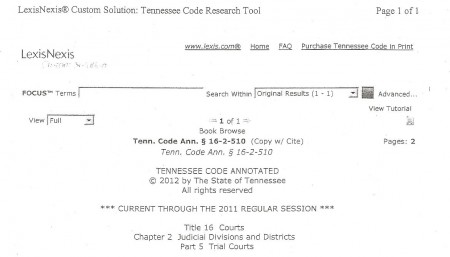
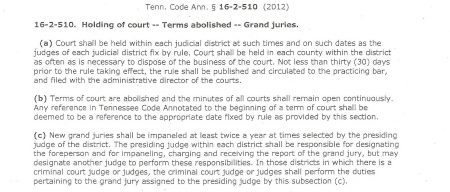

Walt has been a great motivator for other folks to get involved in the judiciary issues.
I had talked with my DA early on to ask if we had any issues in north GA that paralleled those in east TN and he assured me we didn’t. I thought he was being straight with me because I had campaigned for him.
However, when I went to use the grand jury in my county I found it to be corrupt. The jurors were computer picked for voir dire from a hand picked pool, the DA sat with the jury during their discussions and of course the jury was not instructed on jury nullification.
But while doing more research I came across a 1981 change to the state codes that precluded grand jury indictments when a citizen was charged by the state. This is in violation of the 5th Amendment so it would seem that anyone who was charged with a capital crime by the state and bypassed the grand jury would need a new trial.
How can these things happen? Is the Constitution just used at random or when it is convenient? The scary part is when these issues are surfaced the “powers that be” ignore them.
Blairsville, GA 30512
May 29, 2012
Attorney General Olens, by FAX:
Amendment V in the Bill of Rights to the U.S. Constitution states that: “No person shall be held to answer for a capitol or otherwise infamous crime, unless on a presentment or indictment of a Grand Jury, . . . “
This is where the charging of George Zimmerman went wrong in Florida, i.e. ignoring the Constitution. Zimmerman was not indicted by a grand jury for his infamous crime as is required by the law found in Amendment V of the Constitution.
Georgia Code O.C.G.A. 15-7-46 Titled: “No right to grand jury indictment” states: “The accused in criminal proceedings in a state court shall not have the right to indictment by the grand jury of the county. “ This is in violation of the U.S. Constitution. The U.S. Constitution is supreme; it says so in Article VI, para. 2. Please start the proceedings to correct this unconstitutional error in the Georgia Codes.
The grand jury “system” as it has come to be is in virtual disarray based on the Founders concepts or actually on concepts predating the Magna Charta. We will be divested of one more effect of Jim Crow in July when jury pools will no longer be handpicked. This will be a start towards the constitutionally mandated trial by impartial jury. The impartiality could be complete if you would issue a memo over your name, with your authority, whereby District Attorneys would be directed to absent themselves from grand jury rooms when the grand jury is in discussion. This is yet another interesting concept but nevertheless, impartiality is mandated by Amendment VI of the U.S. Constitution.
The grand jury was put in place by the Founders as the fourth branch of government, i.e. a people’s/citizen’s grand jury to stand between the government and the People. If the District Attorney, who is a an agent of the state, is to be in the jury room, then by extension the grand jury becomes an agent of the state and not of the People. And furthermore, it would be a nice touch if the jurors could know that they are mandated by the Georgia Constitution to judge the facts and the law.
For the Republic,
M. J. Blanchard
cc:
media, grassroots,
District Attorney Langley, Judge Gunter
Representative Allison, Senator Gooch
“When law ends, tyranny begins.” John Locke. The Second Treatise of Civil Government
Welcome to the Monroe County railroad association! What’s more insulting is the state knows this is going on and has neglected to even uphold it’s own laws. In essence you have a completely rogue county. Well, Walter has broken their cookie jar and now the tantrums will begin.
This may explain why Walt’s habeas was passed up to the 10th District from the county. They were doing some of the criminal work at the district level. However keeping the grand jury in the county, in a county as corrupt as Monroe, is to the advantage of the powers in control because they could maintain that control.
If there are no superseding documents, then Walt has a huge find. However Walt could run into the same old run around of judicial rules, regulations, procedures, protocol, etc. that will give the judges cover to dodge the codes. But codes are the law and in Walt’s own words; rules don’t trump the law.
But who is to tell these outlaws that their rules can’t trump the law?
Sharon, This is what I call a miracle and an answer to my prayers for Walter.